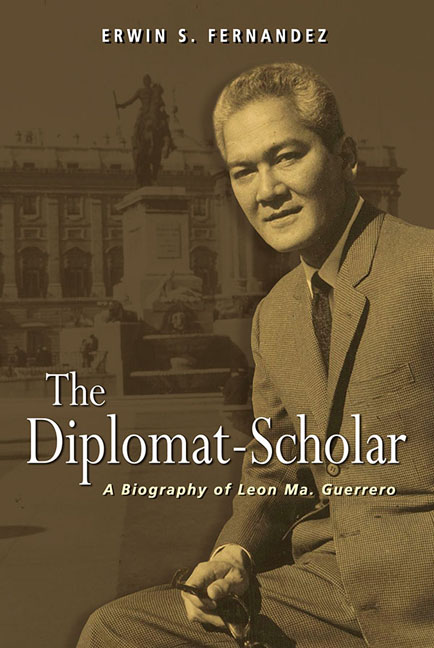Book contents
- Frontmatter
- Dedication
- Contents
- Preface
- Prologue
- Chronology
- I Ermita and Santa Cruz to Intramuros: Between Literary and Legal Career
- II To Tokyo and Back: The Making of a Diplomat
- III Going In, then Out of the Political Jungle: Padre Burgos to Arlegui
- IV London and Madrid: The Philippines in a Resurgent Asia
- V New Delhi to Belgrade: The Philippines towards Non-Alignment
- 18 Homecoming to Asia at Nehruvian India
- 19 “Diplomacy of Development” and Other Speeches
- 20 The Foreign Policy Rescuer and Again, Critic
- 21 The Diplomat as Efficient Intellectual-Bureaucrat
- 22 Endorsing Non-alignment amid Personal Crisis
- 23 Flirting with Dictators
- 24 Martial Law Propagandist
- 25 At Tito's Pre-Balkanized Yugoslavia
- Epilogue
- Glossary
- List of Abbreviations
- Bibliography
- Index
- About the Author
23 - Flirting with Dictators
from V - New Delhi to Belgrade: The Philippines towards Non-Alignment
Published online by Cambridge University Press: 12 January 2018
- Frontmatter
- Dedication
- Contents
- Preface
- Prologue
- Chronology
- I Ermita and Santa Cruz to Intramuros: Between Literary and Legal Career
- II To Tokyo and Back: The Making of a Diplomat
- III Going In, then Out of the Political Jungle: Padre Burgos to Arlegui
- IV London and Madrid: The Philippines in a Resurgent Asia
- V New Delhi to Belgrade: The Philippines towards Non-Alignment
- 18 Homecoming to Asia at Nehruvian India
- 19 “Diplomacy of Development” and Other Speeches
- 20 The Foreign Policy Rescuer and Again, Critic
- 21 The Diplomat as Efficient Intellectual-Bureaucrat
- 22 Endorsing Non-alignment amid Personal Crisis
- 23 Flirting with Dictators
- 24 Martial Law Propagandist
- 25 At Tito's Pre-Balkanized Yugoslavia
- Epilogue
- Glossary
- List of Abbreviations
- Bibliography
- Index
- About the Author
Summary
Besides having visited Mexico to attend a Latin American conference the year Philippine-Mexican Friendship Year was proclaimed in which he visited Guadalajara and Navidad where he unveiled a monument to Legazpi and Urdaneta, while posted in Madrid, Guerrero understood the historical antecedents of Philippine-Mexican relations. In 1963, speaking in Madrid, he discussed with extraordinary erudition the close relations, deep connections and the surface differences between the Philippines and Latin America, or to use his term, Iberian America. More than the differences, superficial at best, were those lessons learned from Latin American experiences. Pointing out the Malolos Constitution as having derived its inspiration from the constitutions of Costa Rica, Mexico, Brazil, Nicaragua and Guatemala whose common roots were found in the French Constitution, Guerrero disclosed that the 1935 Philippine Constitution contained safeguards and guarantees owing to the political history of Latin America. Among those were the provisions banning the re-election of a president to prevent the perpetuation of one-man rule, and the care of the national defence placed under a civilian secretary to forestall military takeovers.
But, again greater than these lessons, Guerrero uncovered “the depth of Philippine-Iberian American kinship” in political concepts, that distinguished the Philippines, although Asian in biology and destiny, from the rest of Asian countries but inevitably linked it with Latin America. The Philippines and Latin America shared problems common in underdeveloped countries almost possessing a commonality found in Hispanic culture, in
an individualistic culture that is at the same time catholic, that is to say, universal; a culture that protects personal conscience, the freedom of individual to be lost, and at the same time submits it to a universal system of beliefs, to dogmas and doctrines outside of which there is no possible salvation …
producing a political and social human prototype in the manner of a Don Quixote and Don Juan. This political culture manifested once when Filipinos under Quezon, Osmeña and Roxas thought that political independence was able to “fix everything, when in truth it was going to reveal and to put everything out of order” because economic independence was left out of the equation.
- Type
- Chapter
- Information
- The Diplomat-ScholarA Biography of Leon Ma. Guerrero, pp. 270 - 280Publisher: ISEAS–Yusof Ishak InstitutePrint publication year: 2017



